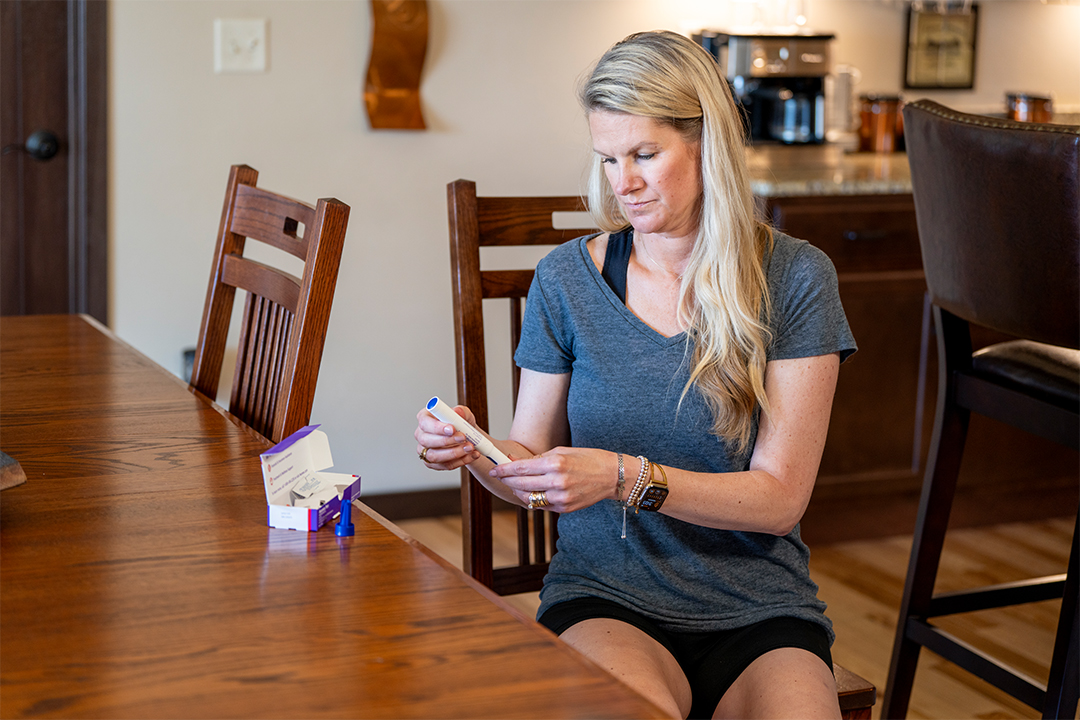
Victoria Reese
Media professional, CEO of We Are ILL
Get started
There’s so much more we all — including the health care industry — can do to better represent and serve Black people living with MS.
We can talk to policymakers about bills that affect people with MS, whether those involve prescription costs, tax write-offs for caretakers or other issues.
Volunteer to be an activist. Go to the state capitol to lobby for different bills for patients with MS. Participate in the National Multiple Sclerosis Society’s State Action Day.
These things feel big, but you can be a part of something that may affect you today or later on. We need to think and act big picture.

Today I feel good and positive. I’m stronger and more equipped.
Improve diversity in MS clinical trials
We need to increase Black people’s participation in MS clinical trials. Low participation is rooted in part in medical mistrust and lack of health literacy — not understanding what trials are about or where the research information is going. Plus, there’s very ugly history that may lead some to wonder, “Are you going to use me as a guinea pig?”
We also need to increase representation in clinical trials. A 2022 Neurology analysis of Phase III trials for MS disease-modifying therapies (DMT) found that race and ethnicity is underreported in trial publications, and race and ethnic representation are absent from manufacturer websites.
Representation is crucial. The analysis notes that “Black and Hispanic people with multiple sclerosis have been found to have different disease courses or worse outcomes associated with MS compared to White people with MS.”
The analysis concluded: “When available, data show that non-White people with MS are significantly underrepresented in MS trials. The availability of this information is crucial for patients, together with their health care providers, to make informed decisions about their care.”
Embrace mental health
We need to support mental health and wellness for the Black community as a whole. But we also need a community specifically for women with MS.
We’re all part of the health care ecosystem. Everyone plays a role.
We must be self-aware enough to know that mental health is part of the MS journey. Doctors need to be aware of this, too, and make sure their patients know how therapy can help them process each step in their journey.
And just like you can’t get medication without insurance, you can’t get therapy without your insurance. We need to make sure people have the access they need.
Increase Black representation in STEM
At We Are ILL, we’re working on creating programming and otherwise encouraging Black people to pursue career paths in science, technology, engineering and math (STEM).
We need Black faces in STEM. We need them as researchers. We need them as scientists. We need them as clinicians.
This helps not only with bedside manner but also in getting people to participate in clinical trials — Black clinicians have a stake in knowing the best ways to treat their Black patients.
Include us in the conversation
I’ve been at advisory conferences where they’re sitting around talking about patients, but no patients are included. Include us at the forefront.
People in the health care community may never think about patients with MS. But if you’re in our lives, if your logo is on our insurance card or you manufacture the medication we take, why can’t we have a relationship?
We’re here. Talk to us. See us. Include us. There’s space for everyone.
Know our stories
Finally, we need to continue to share Black people’s stories and voices.
This is mine.
When I was first diagnosed with MS, I was hopeful for my life. I had big dreams and plans. The diagnosis put a bit of a pause in those because I thought, “I can’t do any of those things now.”
And I was already fighting against generational curses. I was the first in my immediate family to graduate from college. The first to move away. And I was going to be the first to have this big L.A. career.
So there was a pause in that hope. But now I feel good and positive. Now I’m stronger and more equipped. Now it’s me against me.
I’m on a disease modifying therapy. I manage it scientifically and, I would say, emotionally. I’m also in therapy — I’m a big advocate. I had to process the diagnosis and the idea of the unexpected. It’s unsettling to know the unexpected is out there.
I work out. I keep it moving. If I can run on a treadmill, I’m going to run on a treadmill. I try to show my gratitude toward my body by doing the work but also by keeping my body moving.
I’ve since moved away from Los Angeles and do my best to maintain the life that I envisioned for myself and that I want for myself. I am a woman of many hats.
I am an associate marketing director at a small Black-owned media agency.
I am CEO of We Are ILL.
I am a public speaker.
And now, I am a mom. Harper is 2 years old, and she’s just like me.
It’s so special when people reach out to me and say, “I got diagnosed, and I was Googling ‘Black people with MS,’ and you came up. Oh, she’s cute. She’s still living her life. Still thriving, moving forward.”
I’m super happy. I’m what I wish I saw.
My multiple sclerosis story
- Read part 1 of my journey, My earthquake: Getting diagnosed with multiple sclerosis
- Read part 2 of my journey, Facing MS as a Black woman
- Read part 3 of my journey, Creating an MS community for Black women
At Optum, we offer resources, programs and clinical support for multiple sclerosis.
Related content

My 17-year journey with multiple sclerosis

Showing up every day when you have MS

Spoon Theory and chronic conditions
References
- Centers for Disease Control and Prevention. The Syphilis Study at Tuskegee Timeline. Last reviewed Dec. 5, 2022. Accessed Jan. 13, 2023.
- Onuorah H, Charron O, Meltzer E, et al. Neurology. Enrollment of Non-White Participants and Reporting of Race and Ethnicity in Phase III Trials of Multiple Sclerosis DMTs: A Systematic Review. Published March 1, 2022. Accessed Jan. 13, 2023.



